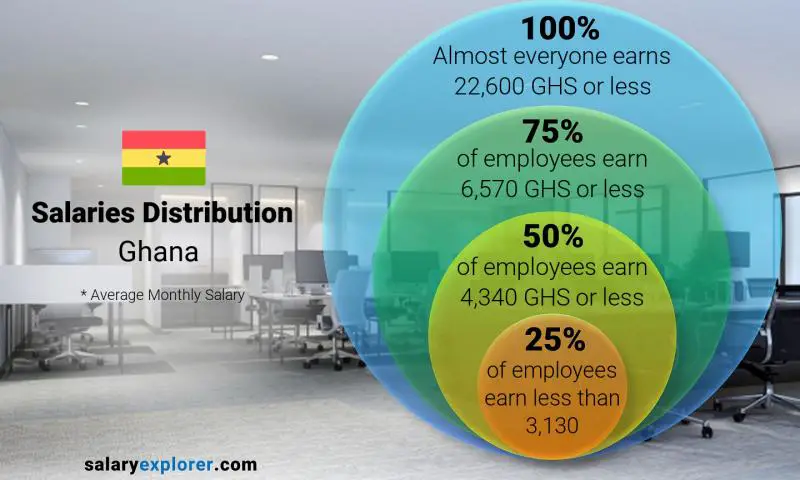Average Income in Ghana
The average income in Ghana is around 880 Ghanaian cedis (GHS) monthly or about USD 155. This is based on the living wage calculation, which considers the cost of food, housing, transportation, and other essential expenses. The actual income of Ghanaians varies widely, depending on their occupation, education level, and location. For example, the average income of a doctor in Ghana is much higher than the average income of a farmer.
The following are some of the factors that affect the average income in Ghana:
- Occupation: The average income of professionals, such as doctors, lawyers, and engineers, is much higher than that of unskilled laborers.
- Education level: The average income of people with a college degree is much higher than those with only a primary school education.
- Location: The average income in urban areas is much higher than in rural areas.
- Gender: The average income of men is higher than the average income of women.
The average income in Ghana has been growing in recent years, but it is still a relatively poor country. The World Bank estimates that the poverty rate in Ghana is 23.4%. This means about one in four Ghanaians live below the national poverty line.
The government of Ghana is taking steps to reduce poverty and improve the standard of living of its citizens. These steps include investing in education and healthcare, promoting economic growth, and creating jobs.

Factors Affecting Average Income in Ghana
Several factors can influence the average income in Ghana. These factors can vary in importance and may interact with each other in complex ways. Here are some of the critical factors that affect the average income in Ghana:
- Economic Growth: The overall economic growth of a country plays a significant role in determining average income. When the economy grows, it often leads to increased job opportunities, higher wages, and improved living standards.
- Education and Skill Levels: The workforce’s education and skill levels directly impact income. A more educated and skilled workforce tends to earn higher revenues due to their ability to take on more complex and higher-paying jobs.
- Employment Opportunities: The availability of job opportunities across various sectors and industries can influence average income. Diversified and expanding job markets can lead to better income prospects for individuals.
- Industry and Sector Distribution: The distribution of economic activities across different industries and sectors can affect income levels. Industries that are more technologically advanced or export-oriented tend to offer higher-paying jobs.
- Labor Market Conditions: Factors such as labor demand and supply, labor union activities, and informal employment can impact income levels. A tight labor market with high worker demand can lead to better wages.
- Infrastructure and Technology: Access to modern infrastructure and technology can improve productivity and enable businesses to operate more efficiently. This can contribute to higher economic output and potentially higher average incomes.
- Government Policies: Government policies related to taxation, labor regulations, social safety nets, and economic development strategies can influence income distribution and overall economic growth.
- Inflation and Cost of Living: High inflation and a high cost of living can erode purchasing power, leading to lower real incomes even if nominal incomes appear to be increased.
- Gender and Equity: Gender disparities and unequal opportunity distribution can lead to income variations. Efforts to promote gender equality and reduce income inequality can positively impact average income.
- Healthcare and Social Services: Access to quality healthcare and social services can impact workforce productivity and overall well-being in the long term. A healthy workforce is generally more productive and can contribute to higher incomes.
Jobs with the Highest Pay in Ghana
In Ghana, some jobs pay more than others. Some positions with the highest pay in Ghana include doctors, lawyers, engineers, and IT professionals. These professions require high levels of education and experience, so they pay better than others.
Jobs with the Lowest Pay in Ghana
On the other hand, some jobs in Ghana pay less than others. These include positions in the agricultural sector, such as farming and fishing. Other low-paying jobs in Ghana include jobs in the hospitality industry, such as waiters and hotel cleaners.
FAQs
What is the average income in Ghana?
As of 2021, the average income in Ghana is $2,202 per year or $183 per month.
What are the jobs with the highest pay in Ghana?
Some jobs with the highest pay in Ghana include doctors, lawyers, engineers, and IT professionals.
What are the jobs with the lowest pay in Ghana?
The jobs with the lowest pay in Ghana include jobs in the agricultural sector, such as farming and fishing, as well as in the hospitality industry, such as waiters and hotel cleaners.
How can individuals improve their income in Ghana?
Individuals in Ghana can improve their income by acquiring more education and skills, starting a business, or investing in profitable ventures.
Is the cost of living in Ghana high?
No, the cost of living in Ghana is relatively low compared to other countries, which means that the average income can go a long way in meeting the basic needs of individuals and families.
Conclusion
In conclusion, the average income in Ghana is relatively low compared to other countries in the world. However, the cost of living in Ghana is also relatively low, which means that the average income can go a long way in meeting the basic needs of individuals and families. Education, industry, location, and experience can affect an individual’s average income. Strategies such as acquiring more education and skills, starting a business, and investing in profitable ventures can help individuals improve their income.
READ MORE | How to Study Physical Chemistry for NEET?

















